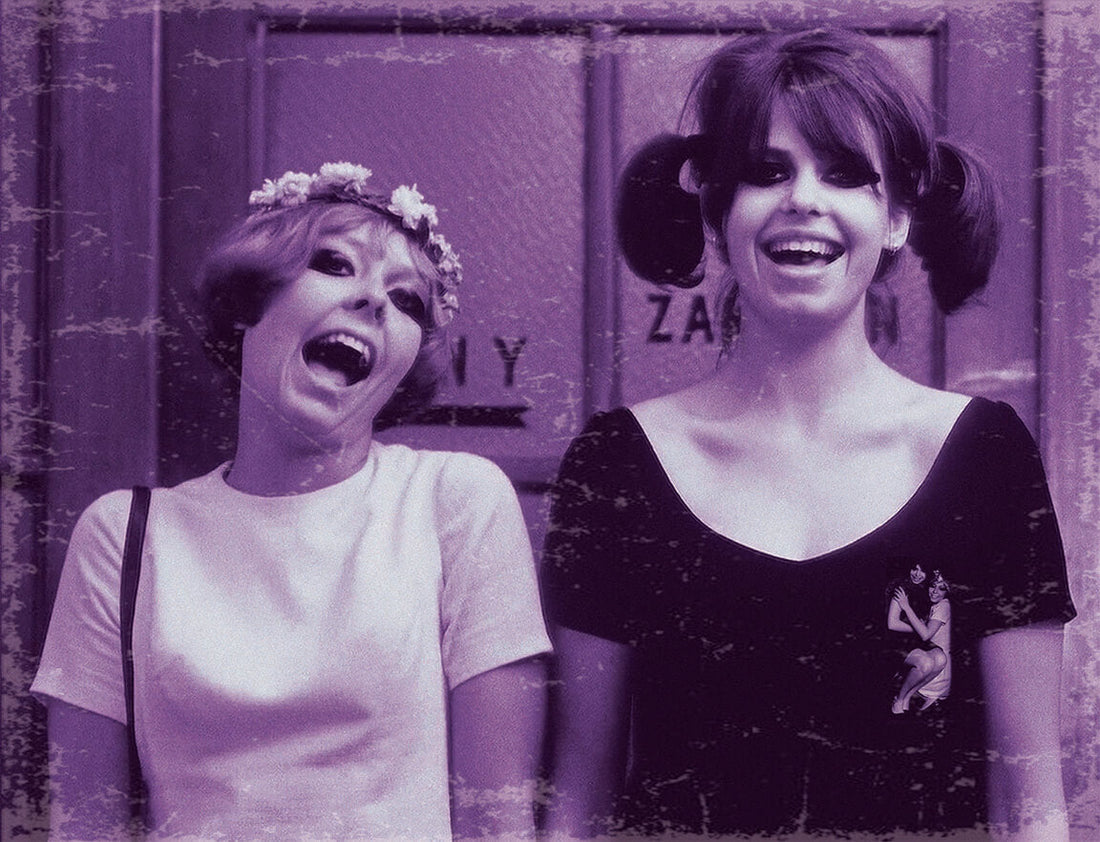SEDMIKRÁSKY (DAISIES) – VĚRA CHYTILOVÁ (1966)
CZECH FILM REVIEW
BY MAX LEONARD HITCHINGS
Sedmikrásky (Daisies) is a Czechoslovakian New Wave film that follows the misadventures of two young women both called Marie (Jitka Cerhová and Ivana Karbanová) as they dance around their apartment, eat copious amounts of food and meet with scores of (very much older) men whom they enjoy teasing, harassing and flirting with before sending them packing by train, seemingly denuded of funds and dignity.
Banned on its release for ‘depicting the wanton’ (and more specifically for the wastage of food), Věra Chytilová’s film may seem tame by today’s standards but certain scenes still pack a punch, not least the extended sequence in which the two women set fire to their apartment and then cut up numerous phallic foodstuffs (sausages, gherkins, bananas) with large metal scissors and eat them in their underwear while one of their obsessive devotees (played by composer Jan Klusák) waxes lyrical on the telephone about how much he loves his ‘Julie’.
“Why do they say “I love you?”, they will later ponder.
The film captures a sense of listless ennui, with its two protagonists exhibiting a playful amorality – at one stage they rob an older woman who showed them nothing but kindness. They wonder why they did it, but show no signs of remorse.
The opening
At first, it seems Sedmikrásky moves through a series of different scenes that by-and-large depict the same type of occurrences listed above, without a clear structure or any kind of linearity – in fact the two protagonists, distinguishable by the colour of their hair if little else, have a kind of mechanical, automatic quality to their lives. This is writ large in the opening sequence which shows us literal gears grinding in machinery contrasted with bombs falling and explosions (US navy footage of WWII), and then cuts to the two women sitting in bikinis, moving their limbs like creaking dolls. The film does in fact follow a structure – the pair start out as these automata but choose to be rebellious – ‘bad’ in their words, (after eating from an ominous apple tree, naturally) and the film shows us how futile it is to go up against the system.

The style
Stylistically, the film has a whimsical quality to it, jumping between different camera techniques, filters and effects, giving it a schizoid, at times psychedelic feel and one gets the impression that Chytilová and her cinematographer husband Jaroslav Kučera are trying things out. The most effective of these is also the most simple – extremely fast cuts of still frames, creating a whiplash stroboscopic effect.

It doesn’t matter
The central thesis of Sedmikrásky seems to be that there are certain circumstances in which giving into every impulse, sometimes decadent, sometimes cruel, has no real consequences because nobody is paying attention. As Marie I and II keep saying, “it doesn’t matter”.
In a later scene, they visit a village where they are shocked to find men that don’t notice them. Like children, they act out because they want to be told off. Having discarded some corn husks in the street in an earlier scene, they now take note of them lying there as proof of their own existence. During her lifetime Chytilová resisted being called a feminist, but it’s hard not to see Daisies as a feminist film – the film shows us these two women, who could be all women or all oppressed people, flailing furiously in the dark. They don’t want to play by the rules set out by the Communist patriarchy that forms the film’s milieu, but in the end they’re just rats raging in so many cages.
The chandelier
In the film’s climax, the two women find themselves in a vast banqueting hall, where a large spread has been laid out in preparation for guests who are absent. Of course they help themselves to everything, tentatively at first, so as not to give away that they were ever there. This soon descends into chaos, with the pair throwing cakes at each other, breaking glasses and crockery and swinging together on a huge glass chandelier.

Suddenly, in a surreal jump-cut, they fall into water. They call for help and promise that they are going to be ‘good’ from now on. They attempt to put everything right by scraping food back onto platters, resetting places at the table and trying to reassemble smashed crockery – a pitiful, shambolic attempt to make amends, really, but that’s the point. Having spent the past hour being ‘bad’, the pair ultimately give in; their once loud, dissenting voices are reduced to the whimpers of children apologising for their naughty behaviour.
“If we’re good and hard-working, we’ll be happy”. Words that could be lifted wryly from any number of Stalinist posters.
In the final scene, the film is dedicated in large red text “to all those whose sole source of indignation is a trampled-on trifle”.

Prague Autumn
Later, following the Prague spring, when many of her contemporaries were leaving the country, Chytilová would stay and continue fighting with the men who controlled culture.
In fact when the Soviet Union invaded in 1968 she was ‘prohibited’ from making films until 1975 – though she did manage to make one – 1970’s Ovoce stromů rajských jíme (Fruit of Paradise), in which she returns to the Edenic imagery seen at the start of Sedmikrásky.
Also included on the DVD is Cesta (Journey), an intimate portrait of Chytilová, by Croatian filmmaker Jasmina Blaževič and an essay by Peter Hames.
Get your DVD copy here

Or Blu-ray here


